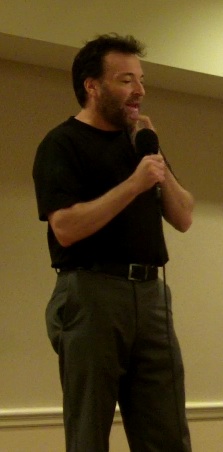Recently when a newly anointed radio station program director asked me for advice on how to become a good PD, the last of my tips was:
“Try not to turn into a jerk.”
Because you’ve probably never had to work with a jerk, here are two true stories about one Jerk Program Director.
Once upon a time, the charismatic architect of a wildly successful, very big radio station left the station he’d helped build.

He was replaced by someone who had worked under him at that station. Kind of a short guy.
What he lacked in stature he attempted to make up for by acting Very, Very Important.
“The Short PD And The Morning Host”
The Short PD inherited a famous, talented, successful, and thoroughly professional morning jock.
The morning jock was required to report to the Short PD’s office after each show, to “meet” about the day’s program.
More often than not, the Short PD would open his mail and talk on the phone while the morning jock — who had just finished a 4-hour show in an extremely competitive market — sat. And sat. And sat.
The Short PD was showing the morning jock exactly who the big shot was in that station.
“The Short PD And The Production Director”
Because he had inherited a very successful radio station, The Short PD assumed that meant he was a genius.
In frequent flashes of inspiration, he would jot down liner copy to be recorded by the station’s outside voice guy.
Then he would email the copy to the voice guy, not bothering to include any instructions as to what kind of feeling he wanted the message to convey.
After all, when your words are brilliant, they need no explanation.
The voice guy (who was both well-known and talented) would record the liners without the benefit of any background or direction and then email an mp3 to the station’s production director.
The production director would find the mp3 in the morning’s in-box. Now it was his job to create a promo around the dry voice.
Because The Short PD was Far Too Important to explain his ideas to the production director, the production director (who was both well-known and talented) would apply his own experience, wisdom and instinct to the final realization of the recorded promo.
All too often, when The Short PD would hear the finished promo, he’d then storm into the production room: “What the hell is this supposed to be??” he’d demand.
After enduring this for several years, the production director decided he’d had enough.
He couldn’t take the The Short PD’s tantrums, his ego (i.e., his massive insecurity masquerading as supreme confidence), his abusive behavior to people who worked for him.
But before the production director could quit, a funny thing happened:
The Short PD left the radio station.
I don’t know if he quit or was fired. But I do know that under his “leadership” the station steadily (and severely) declined in market position.
A new PD was brought in.
The production director decided to stick around just a little while longer, to see what the New PD was like.
And the production director couldn’t believe it:
The New PD actually discussed upcoming promotions with the production director before starting work on the promo copy.
The New PD gave as much information as possible to the voice guy before the voice guy recorded the liners.
The New PD, the production director, and the voice guy actually worked as a team.
The production director is still there. So is The New PD (not so new any more).
It took some time to undo the damage inflicted by The Short PD, but the station’s ratings are very healthy now.
You can’t fake Leadership. Not even with lifts in your shoes.



